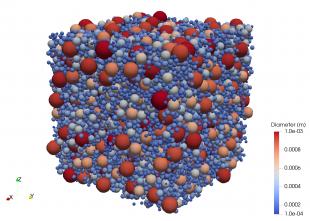Many structures are subjected to cyclic loading during normal operation, e.g., renewable offshore wind turbines are likely to experience millions of load cycles, with variations in cycle magnitude and frequency, during their service lives. These forces are transmitted to the underlying soil which may cause unacceptable soil displacements to accumulate gradually over time. This will reduce the performance of the structure and eventually lead to failure, unless the effect of cyclic loading on soil strength has been addressed properly in the design. It is important to understand the key characteristics of soil response to cyclic loads in order to ensure safe and efficient structures. One way of evaluating the effects of such load cycling on soil is to conduct laboratory tests or full-scale field tests. These tests capture the macroscopic soil behaviour but give no insight into the governing micro-scale behaviour. Numerical techniques are capable of providing this information on the dynamic changes occurring at the micro-scale that cause the observed macro-scale response.
The main aim of this PhD research is to investigate the behaviour of Dunkerque sand subjected to cyclic loading using the discrete element method (DEM). There are three main parts to this study. Firstly, undrained, monotonic triaxial loading simulations of Dunkerque sand are being conducted. As part of this research, a variant of the constant volume method has been developed which takes into account the compressibility of the pore fluid. This monotonic shearing will help in understanding and interpreting soil behaviour under cyclic loading. Secondly, DEM simulations are run under undrained triaxial cyclic loading, and the significance of the various simulation parameters is investigated. Thirdly, the energy transfer and dissipation within cyclically sheared Dunkerque sand samples are evaluated using DEM. These studies will help in interpreting the causes of macro- and micro-mechanical responses in sand samples under cyclic loading.
References
[1]A. Aghakouchak. Advanced laboratory studies to explore the axial cyclic behaviour of driven piles. PhD thesis, Department of Civil and Environmental Engineering, Imperial College London, 2015.


![Particle Size Distributions (PSD) of Dunkerque sand [1] Particle Size Distributions (PSD) of Dunkerque sand [1]](https://eng.ed.ac.uk/sites/eng.ed.ac.uk/files/styles/medium-2/public/images/research/projects/PSD.png?itok=zwSkn1Eq)

